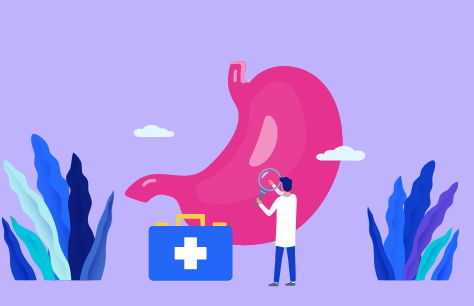





Helicobacter pylori is a pathogenic bacterium that is characterised by its spiral form. The bacteria colonises the stomach and survives in the hostile acidic environment. The condition is characterised by an inflammation of the stomach, known as gastritis. Helicobacter pylori infection is a prevalent condition, affecting approximately 4.4 billion individuals worldwide. The bacterium is primarily transmitted through the oral route, typically occurring between parents and children or between siblings. The condition is primarily transmitted during childhood and persists throughout a person's life if left undetected and untreated.














Stomach inflammation (gastritis) often goes unnoticed and does not cause any symptoms for several years. Problems with your stomach (e.g. stomach pain) can also happen and get worse over time, leading to conditions like ulcers and, rarely, stomach cancer. Bacteria are very important in causing ulcers. Most ulcers (70 to 95%) are linked to a Helicobacter pylori infection. It is also responsible for most stomach cancers (up to 89%). If you have any of these symptoms, you should see your doctor straight away. You might have a stomach infection called Helicobacter pylori.2,3

As soon as the first symptoms appear, it is important to consult your doctor. Depending on the troubles that you describe and whether he believes that bacteria could be responsible, he will offer to perform a diagnostic test to detect the presence of bacteria. Based on the results of this test, the doctor will then advise on next steps.
There are several techniques for detecting the bacteria:

In the majority of cases, Helicobacter pylori can be treated expeditiously. The treatment is based on the administration of multiple antibiotics in conjunction with a medication that reduces stomach acidity. The duration of this treatment is between 10 and 14 days. In the event that this treatment proves to be ineffective, a decision will be taken to modify the antibiotics.


Treatment failure can occur in 10-20% of cases, either because the bacteria is resistant to the
antibiotics being used, or because of poor adherence to treatment. Therefore, your doctor will ask
you to take another test to confirm that the bacteria was eradicated by the treatment you have just
taken. If, however, there is still bacteria present, another additional treatment will be
prescribed.
In order to confirm that the bacteria has indeed been eliminated, different tests can be used:

Your general practitioner is your point of contact. He knows you and will find the proper questions to ask. Family history, lifestyle, age, and symptoms… All of these factors can guide and, if necessary, lead him to make a diagnosis.
If necessary, your doctor may prescribe a test to detect the presence of the bacteria. If the test is positive, he will prescribe a treatment and will check that this treatment was effective through a post-treatment test. He may also refer you to a gastroenterologist who could, for example, perform a fibroscopic exam to pursue the investigation.

Changing your diet is not sufficient to treat the infection, but may help reduce stomach discomfort and pain. In addition, studies have shown that some dietary habits, such as eating too much salt, too many proteins and smoked foods, may be involved in the occurrence of gastric cancer. Furthermore, the consumption of anti-oxidants (vitamin E, Beta-carotene or provitamin A, ascorbic acid or vitamin C) in fruits and vegetables, even in small quantities, seems to reduce the risk of developing gastric cancer.
If the treatment is not strictly followed (number of doses, time of intake and treatment duration) or if it is discontinued prematurely, the bacteria may not be completely eradicated, and they may develop a resistance to antibiotics. If this is the case, you will have to take a new treatment composed of different antibiotics that the bacteria are not resistant to, in order to completely eradicate it. If you have some problems to take your treatment, consult your doctor for advice.
The recurrence of the infection is theoretically possible, but rare in adults in Western countries (2 to 3% per year). Therefore, performing a test for a potential new infection is not recommended if the eradication of the bacteria was confirmed by a post-treatment test.
Completely getting rid of the bacteria allows the layer of the stomach and the ulcers to recover from the inflammation with an extremely low risk of relapse.
The Helicobacter pylori test in children is only justified if symptoms appear suggesting stomach disease. Healthcare authorities and academic societies do not recommend screening for Helicobacter pylori if there are no clinical signs (stomach troubles).
Screening for Helicobacter pylori is highly recommended if a member of your family (parents, siblings) has or had pre-cancerous or cancerous lesions. In fact, the relatives of a patient who had stomach cancer are more prone to a Helicobacter pylori infection that can, in some cases, lead to cancer.
No, there is currently no vaccine against a Helicobacter pylori infection.
In theory, a vaccine is feasible. However, given that a Helicobacter pylori infection can be easily
diagnosed and treated, the benefit of a large scale vaccination remains low.
The infection is mainly transmitted through secretions coming from the stomach:
- Through direct contact with vomit, regurgitation or infected saliva
- Through the fecal-oral route due to poor hygiene
The bacteria is mainly transmitted between members of the same family, particularly children. The
risk of transmission seems to decrease after 5 years of age.
1. Hooi JKY, Lai WY, Ng WK, et al. Global Prevalence of Helicobacter pylori Infection: Systematic Review and Meta-Analysis. Gastroenterology. 2017 Aug;153(2):420-429.
2. HAS, Treating Helicobacter pylori, March 2019
3. Pasteur Institute, https://www.pasteur.fr/en/medical-center/disease-sheets/stomach-cancer-and-gastric-ulcers#:~:text=duodenal%20ulcer%20develops.-,H.,and%2070%25%20of%20gastric%20ulcers, consulted 11/06/2025
4. HAS, Screening for Helicobacter pylori, March 2019
5. HAS, Diagnosis of Helicobacter pylori infection in adults, May 2017